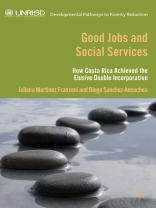Few countries have achieved social development, which requires simultaneously securing market and social incorporation (good jobs and access to social services). This book reviews Costa Rica’s experience as one of the few successful cases of double incorporation in the periphery.
表中的内容
Acknowledgements 1. A Country That Tamed an Alusive Challenge 2. Two Distinct Phases of Market Incorporation 3. The Social Policy Regime: Creation, Expansion and Resilience 4. The State as the Central Actor: Elites, Ideas and Legacies 5. Conclusion: What can we Learn from the Costa Rican Case? References
关于作者
Juliana Martínez Franzoni is Associate Professor at the University of Costa Rica. Her work on social policy formation and socioeconomic and gender inequality in Latin America has been most recently rewarded with fellowships by Fulbright, the Kellogg Institute for International Studies and the British Academy. She currently conducts research on the formation of universal social policies in the periphery, and changes in work–family policies in Latin America.
Diego Sánchez-Ancochea is University Lecturer in the Political Economy of Latin America at the University of Oxford and Governing Body Fellow of St Antony’s College. His research, which focuses on state–society relations, income distribution and public policy, has been published in journals, including World Development, Journal of Latin American Studies and Studies in Comparative International Development.












